#fairy tale reaction
Text
6. Faithful John
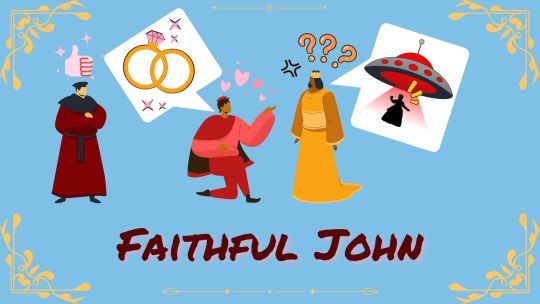
This week I am reading the 6th story of the Brothers Grimm fairy tales about a faithful servant helping his king kidnap court a princess.
We will see some literal swoon worthy art, an Oscar-winning acting performance by a trio of ravens, and a VERY questionable cure for fainting.
~~~
An old king is dying and calls for his servant Faithful John (is Faithful his first name and John his family name??). Faithful John is the king’s most favorite servant and got the name (aw drat) because he had been true to the king his whole life (I sense some serious foreshadowing here. 50 gold says something is going to happen that makes the king doubt Faithful John and feel bEtRaYeD but John the Faithful will remain loyal despite the king banishing him or throwing him in prison or feeding him to the sea monster or the like but Mr. John will be rewarded for his loyalty after much, much suffering. It better include a good retirement plan.)The king asks politely orders John to be his son’s foster-father so he can die without worry. John agrees and says he will be as loyal to his son as he was to the king (okay it’s going to be the SON who causes all the drama for John before realizing he royally messed up)...
~~~
Continue reading here.
#fairy tale#fairy tales#brothers grimm#fairy tale reaction#fairy tale recap#grimm brothers#faithful john
1 note
·
View note
Text



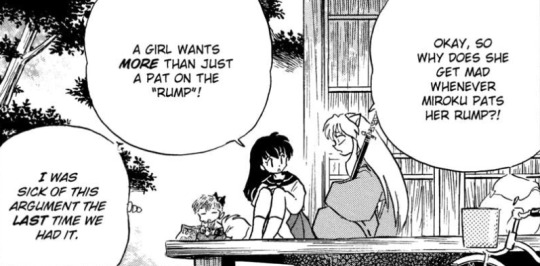

gossiping inukag is the best inukag, actually (ft disgruntled younger brother shippo)
#inuyasha#inukag#inuyasha x kagome#this scene is one of my absolute favorites#just them being gossipy friends#love the idea of inuyasha picking up village gossip when they're married and coming home like “you won't believe what I just heard”#and like he doesn't tend to care much about what other people are doing but he likes to see her animated reactions to things#“...and so that's why tatsuo is remarrying” “oh my GOD! - pass the miso."#inugang#inuyasha a feudal fairy tale#kagome higurashi
497 notes
·
View notes
Text
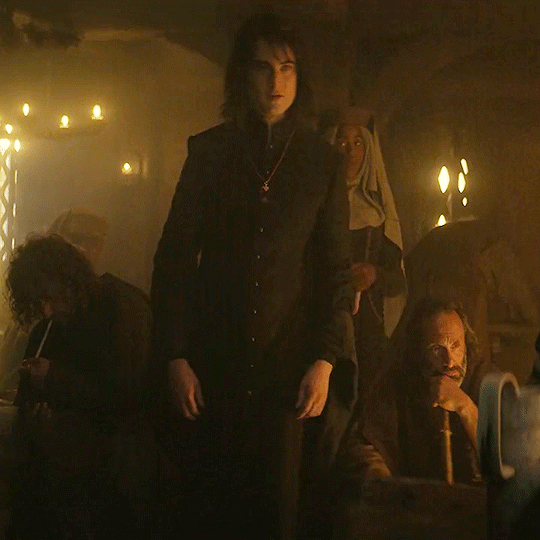

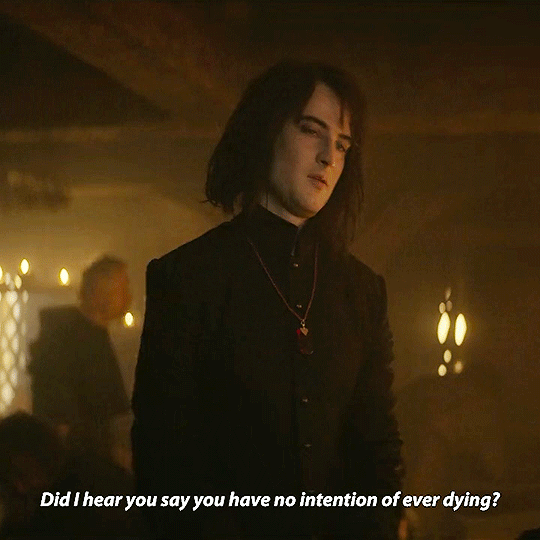
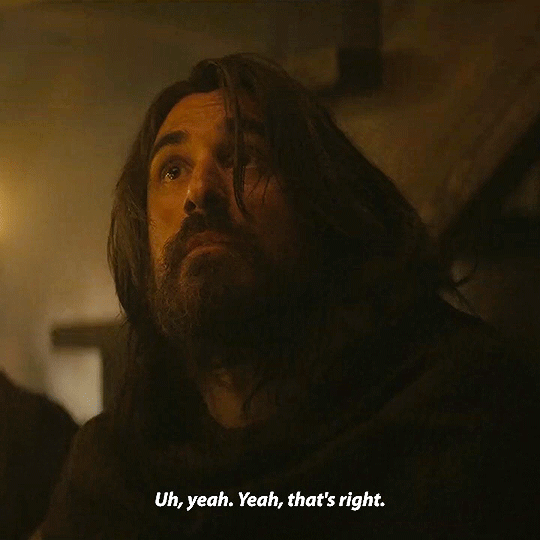
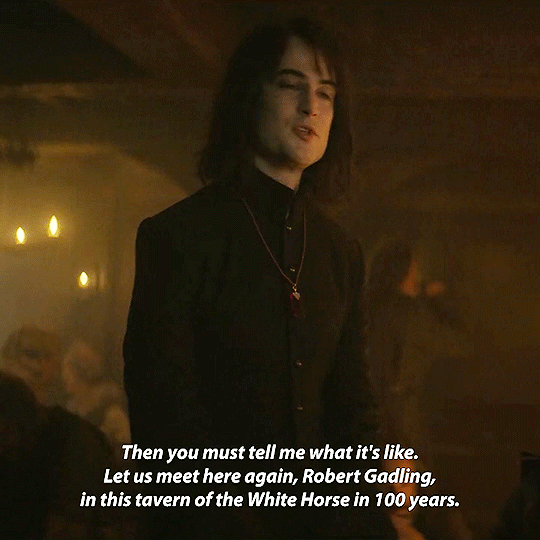

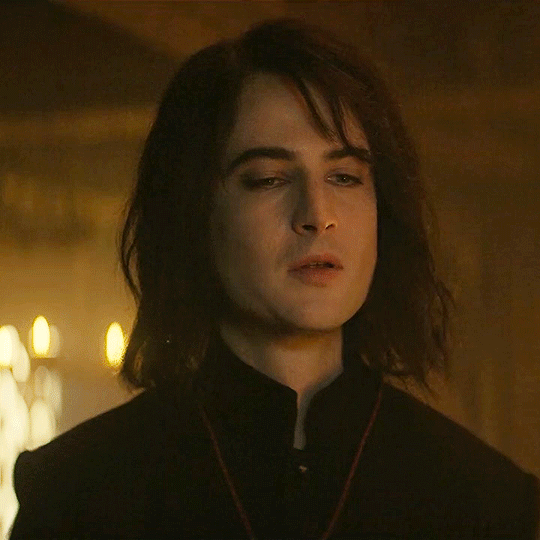



The fateful meeting
The Sandman | 1.06: The Sound of Her Wings
#sandman#the sandman#hob gadling#morpheus#dream of the endless#Loved this scene so much#Feels like an old fairy tale#Look at Dream awkwardly coming over like a penguin#Look at how smug he is#He's in for a surprise#Didn't someone ask if there's a gif for Hob's first reaction to Dream? Can someone link this to them if you happen to stumble upon them?#thesandmanedit#sandmanedit#dcedit#robert gadling#death of the endless#the sandman netflix#netflix the sandman#gifs#gifset
2K notes
·
View notes
Text
Don't mind me, just blasting "Accidentally in Love" by Counting Crows while looking through Puss in Boots tag and crying at how beautifully written Puss and Kitty's romance is!
Favorite line:
These lines of lighting mean we're never alone! Never alone!
Favorite scene:
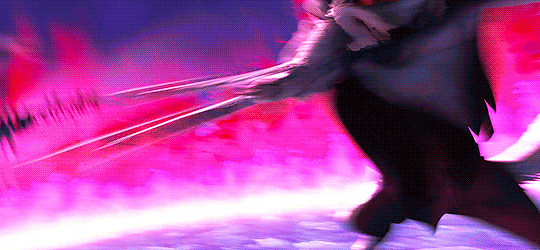
If you don't understand how this moment is considered romantic, watch the film until you do!
#puss in boots: the last wish#puss in boots#romance#and written well#puss in boots spoilers#the way I gasped and cried when he pulled that blade out#using a gift she gave him out of love for him#and then him using that gift to fight for his life against death#a life he wants to spend with her!#oh and the reaction on Kittys face#my hearted melted#i also adore how realistic they're romance is#they don't have that fairy tale romance#for characters that live in a Fairytale book#they have realistic problems#that get solved with the help of a therapy dog
400 notes
·
View notes
Text
every day i think about the ansur plot in act 3 could've actually had emotional weight if larian studios gave a shit about wyll. damn.
#like the whole gauntlet is about expressing the type of heroism that wyll has striven for his entire life.#the way the quest is so prototypical in it's fairy tale sensibility of the honest and true hero awaking a dragon under the city and -#saving the day and he goes through this whole gauntlet that's a test of how well he ascribes to the ideals of balduran and his father -#and everything he ever clung to to validate himself to himself after being coerced into mizora's deal as a 17 year old kid and then -#he succeeds! he passes the tests! only to find that ansur (literally named answer) is an undead abomination you have to put down#like it's SO SAD. and to me a big part of his story is accepting who HE is. seeing himself outside of his deal w mizora or what his father#wanted him to be and the fact that wyll isn't allowed to have a big emotional reaction to the ansur situation is so annoying#in fact wyll doesn't EVER get to have an emotional reaction to anything bc larian studios doesn't care enough to flesh his story out -#despite giving him one of the most interesting ideas for a character in the game! like act 3 should be WYLL'S act! he's so tied into -#everyone important in that act that it's actually a crime that he's sidelined the most there and he doesn't have enough vocal fans -#that larian studios will ever care enough to patch his story or add anything like they did for karlach or astarion. it's so dumb.#and it sucks that the writers don't recognize wyll's abuse bc his abuser is a hot devil lady. what she does to him is sick. god.#anyway. whatever.#baldur's gate 3#my posts#.txt
13 notes
·
View notes
Text
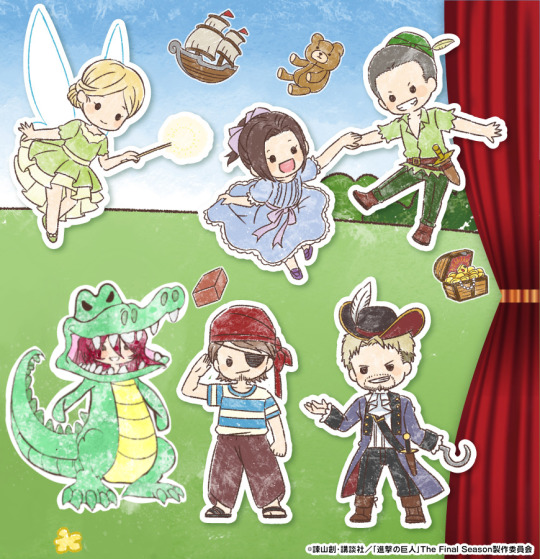
So that one AOT x graffart fairytale themed collab? XD I had this brilliant idea spark (ノ◕ヮ◕)ノ*.✧ 🐊⏰
#Reiny's reaction? probably actually asks himself if she's not feeling too hot in that thing 🤧🤧🤧#also asks himself how tf is he supposed to hate it when she's so goddamn adorable it's even amusing.#he had tears formed when surpressing a laugh#mai thoughts#my art#aot oc#oc x canon#reinelyncore#reiner x oc#reiner braun#Evelyncore#graffart#peter pan#fairy tales#attack on titan
8 notes
·
View notes
Text
when I'm rereading the land of stories and see the twins' grandma mentioned and are internally screaming BRYSTAL
#no bc y'all should have seen my reaction when i realized that a tale of magic was based on the fairy godmother#the land of stories#a tale of magic#chris colfer#brystal evergreen#alex bailey#conner bailey
27 notes
·
View notes
Text
Coming to the conclusion that the two most valid ways to retell "King Thrushbeard" are:
Good-faith retelling that understands it's not meant a story about humiliation but about learning humility
Screwball comedy
#fairy tales#fairy tale retellings#king thrushbeard#i've been a bit obsessed with this fairy tale ever since i reread stradling's retelling and saw the lent connections#my thoughts are a reaction to hers because she has the typical take of seeing it as a toxic relationship#so she makes the two of them victims of her evil father#which makes a decent-enough retelling#but both her leads are a bit toothless#the great thing about this fairy tale is that it's one of the few with an mc who has a character arc#and she completely guts that part of it by making them both decent reasonable people whose only flaw is being too hard on themselves#and i think there's room for a non-toxic retelling that takes this fairy tale at its face value#and recognizes that girl needs an attitude adjustment#but also there's a ton of comedy potential in this story#difficult women and false identities and all sorts of misunderstandings#it's what rom coms are made of
37 notes
·
View notes
Text
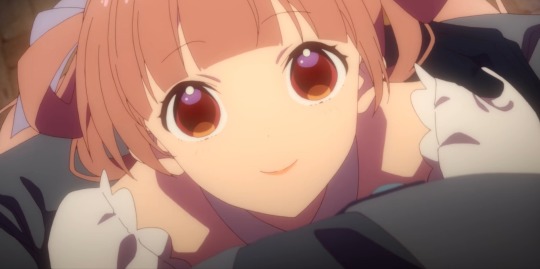
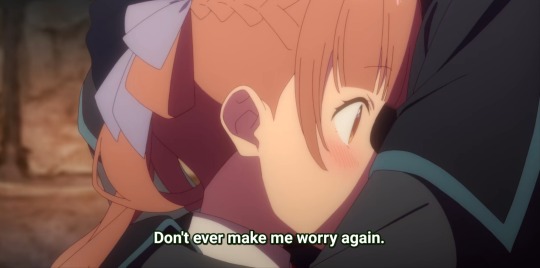
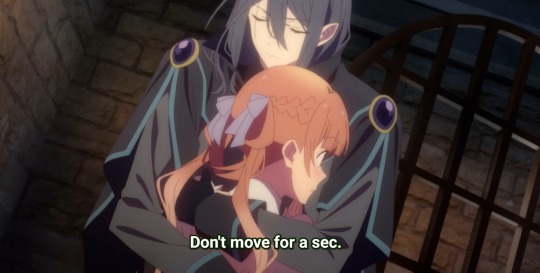
A sugar rush dive indeed (。・//ε//・。)
#anime#anime cute#romance anime#screencaps#anime recommendation#romance#love anime#animelove#anime and manga#love#cute anime couple#cute couple#sugar apple fairy tale#anime reaction#anime lover
20 notes
·
View notes
Text
5. The Wolf and the Seven Little Kids
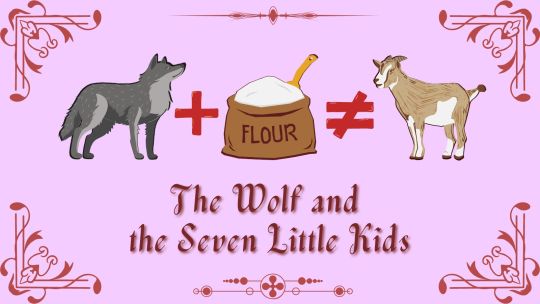
This week I am reading and reacting to the 5th Brother's Grimm fairy tale about a wolf attempting to eat a goat family.
We will see some questionable disguise choices, a game of goat hide and seek, and some family fun arts and crafts.
~~~
An old mother goat has seven kids. She needs to go the forest to get food (what, is the store there or something?). She warns her kids that the wolf might try to eat them and he is a master of disguise except for his rough voice and black feet.
Sure enough, the wolf knocks on their door pretending to be their mom but the kids recognize his rough voice and tell the faker to leave. The wolf then eats a lump of chalk(???) to make his voice soft. (WHAT. Is this a thing?? I need to look this up…)
Continue reading on my website blog here.
#fairy tale#fairy tales#brothers grimm#fairy tale reaction#fairy tale recap#grimm brothers#the wolf and the seven little kids#goats#wolf
1 note
·
View note
Note
Since you have a (working?) title for your cryptid Jonathan project, have you thought about what title/s you'd give to the reincarnated Mina (that one inspired by @animate-mush and @mayhemchicken-artblog ) one if you've decided what direction you'd want to take it to?
(Sorry for adding to the pile while you're already busy answering/writing!)
me, currently:
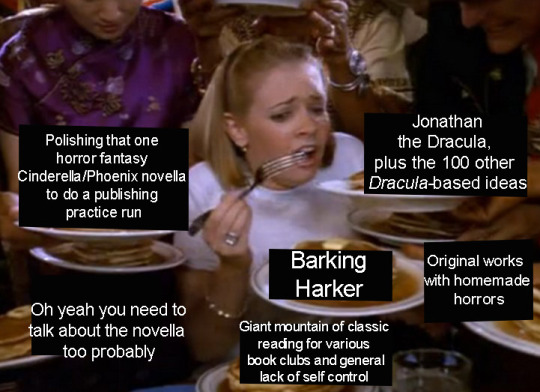
I'd say I have a full plate, but it's really several plates stacked with other plates and all of them are spinning.
But I will never miss an opportunity to write about my writing rather than actually writing!
To answer your question, no, I don't have a proper title in mind at the moment beyond the placeholder, "Jonathan the Dracula." If and when I do come up with a more polished name, I don't want it to be super derivative of Dracula. No 'Son of Dracula' or 'Anno Dracula.' I'd want it to be a semi-twist surprise for readers (who aren't aware of me yammering about it here).
It's a discovery for the audience as much as for Mina 2.0 exactly who this guy is. I want it to be a build up of:
First impression: "Hm. Weird guy. Vampire? Vampire."
Second impression: "Oh! Dracula?"
Final impression: "JONATHAN HARKER THE DRACULA??"
Which means I have to be careful about names and opening settings, et cetera. Even any future synopsis for a book jacket would have to keep the full hinting to a minimum. So, yeah. Good Cool Title is still very much pending. Right now it's just Jonathan the Dracula/Jonathan Harker the Dracula.
#I want a full Perry the Platypus reaction here#jonathan the dracula#jonathan harker#monster jonathan harker#dracula#dracula daily#my writing#also I should probably mention the fairy tale novella thing at some point too but#nah#not yet
31 notes
·
View notes
Text
A reaction to TV Tropes’ “Dead Unicorn Tropes”
TV Tropes and Idioms is a great site, and a bad website.
For dissecting fiction, identifying tropes, throwing little tidbits of cool info and fun trivia, it is a great site.
For actually teaching people real things about the world, or when it comes to its generalizations of genres and styles... it can be very bad.
I have this love-dislike relationship (not hate though) with TV Tropes because this site was so useful for me so many times I can’t imagine not living without it ; BUT I also noticed so much wrong things posted or written in pages because TV Tropes is not kept by actual experts and anyone can actually write anything in there - hopefully people double-check and hold the website together, but a lot of false, incomplete or biased information just slips by as it lacks Wikipedia’s stern neutral position.
And as I was scrolling through the pages I found the “Dead Unicorn Tropes” page. A page listing tropes that are basically “dead horse tropes” (that is to say over-used, over-parodied, over-played with, over-referenced tropes to the point they are seen as painfully cliche, greatly unfunny or dreadfully doll and boring owadays) - but with the twist that they are “unicorns”. Aka... while everyone treat these tropes as ancient, worn-out, over-used cliches, they never actually existed as “tropes” in the first place. They never were as popular and widespread as people believed - it is basically the Mandela Effect, but for popular culture.
For example many people think that James Bond wears a tuxedo all the time - when in truth he always just wore tuxedos for a few crucial scenes. But given they were among the most iconic and well-known scenes, popular culture developped the belief that James Bond was ALWAYS in a tuxedo. Or a lot of people parody romance animes by having the main protagonist running late for school with a toast in their mouth only to bump into someone... despite this scenario never being widespread or really used in the first place in animes of this genre.
Anyway... What caught my eye was a specific section of this page. A section dedicated to fairytales. And this being a fairytale blog... let’s react!
Fairy tales' supposed idealism and inevitable happy endings are commonly mocked and "deconstructed", most people being unaware that the real stories were often violent, cynical, and depressing. It's something of a Cyclic Trope, since the original stories had such a grim tone, before being bowdlerized and Disneyfied because Children Are Innocent (which is in itself an example of this trope), causing the stories to end up in an Animation Age Ghetto, which left them filled with Fridge Logic and other ripe fodder for deconstruction. On the other end of the spectrum, the belief that all fairy tales were originally gory grimdark horror stories before their Disneyfication is similarly exaggerated; the most common gratuitously violent passages that modern adaptations tend to leave out involve the deaths of the villains at the story's end. Grimmification as a trope is a rather ironic appellation, as The Brothers Grimm were in fact the Ur-Example of Disneyfication, with many of their stories being even darker before the Grimms retold them (but still not the nightmare gorefest people like to think).
I don’t have much to add to this section. The complicated thing with TV Tropes is that it mixes all fairytales together, not separating their origins, genres, cultural context - but what you can be sure about is that when they generalize “fairytales”, they actually talk of the “Western fairytales”, the specific chain of fairytales that went Italian-French-German.
It is true that the original Italian fairytales (well... they weren’t fairytales because the term fairytale was invented by the French, but these were proto-fairytales) were filled with sex, violence and grotesque elements - but that was because they were farcical humoristic stories, part of a long tradition of surreal bawdy slapstick tales inherited from medieval times, and they were entirely destined to adults.
The French fairytales were a “Disneyification” as TV Tropes says : because they became courtly tales told by nobles, aristocrats and intellectuals - it was the introduction of traditional fairytale princesses, of virtues and beauty winning over vice and ugliness, of delicate dialogues and scenes out of pastoral romances, etc... Perrault was the one who removed from Little Red Riding Hood the most gruesome details (such as how the wolf, according to some versions, leaves a bit of the blood and flesh of the grandmother for Little Red to eat). BUT on the flipside, French fairytales were FAR away from being Disney fairytales. They were “dark” as while they removed obvious sexuality they kept all the violence, from Bluebeard killing his wives in a chamber of blood to ogres eating their own children while being drunk one night. And while happy endings were very common, they weren’t a standard of fairytales: Charles Perrault’s Little Red Riding Hood ends with the girl being eaten by the Wolf, and that’s it - because it is a warning tale ; while Madame d’Aulnoy’s The Yellow Dwarf ends with the two lovers dying and becoming a couple of trees - due to the story being inspired by ancient myths.
As for the German fairytales, the work of the Brothers Grimm... On one side they do seem “darker” than the French fairytales due to trying to imitate/stay more faithful to the original folktales, and thus they include much less refinment, much less clear virtues and vices, much more bizarre, disturbing or murky elements... But nothing is too simple, as the Brothers Grimm also HEAVILY “Disneyified” fairytales - they cut down many tales from their book they deemed too “immoral” ; they added many happy endings (they invented the Woodsman saving Little Red Riding Hood) and they changed many dark elements (Snow-White’s stepmother was originally the girl’s mother).
Overall it is impossible to pin-point a specific “culprit” for making fairytales “lighter” or “darker” because each new incarnation of them has its own part of darkness and lightness... But TV Tropes might also evoke “fairytales” as in “literary fairytales VS folkloric fairytales” - opposing the fairytales written down by authors who actually tried to create a work of literature (all the fairytales talked about above are part of this category) to the actual “fairytales” told by common people, part of folklore and which inspired the literary fairytales. That is another often overlooked simplification: the fairytales we know are all literary works - inspired by folktales yes, but the same way you can have television shows, movies or podcasts inspired by folktales. And under this angle - yes, definitively, all the literary works put a “lighter” twist on the original tales of the common folk.
True Love's Kiss is not an original element to most fairy tales, but is rather a Disneyfication element. Many fairy tales' protagonists did indeed have The Big Damn Kiss, but it's not meant to be something especially powerful or magical, like a Deus ex Machina. Taking a survey of the most popular such kisses: in the Grimms' version of "Sleeping Beauty", the prince does awake the title character with a kiss, but that's just coincidence because he happened to be there when her hundred-year curse expired;note and in "Snow White", the prince never kisses Snow White, but instead drops her coffin and dislodged the chunk of poisoned apple stuck in her throat. The Ur-Example of the trope was in Norse Mythology, of the Valkyrie Brunhilda who was punished by Odin to sleep on a couch surrounded by fire and was awakened with a kiss from the hero Siegfried.
True! Well, almost... “true love kiss” was present in some French fairytales (as part of the “courtly love” angle - later taken back by the Grimms who wanted to make some tales “cleaner”), and fairytales do have magical kisses of various kinds, but 1) the term “true love kiss” was invented by Disney for its Snow-White movie and 2) the concept of a magical kiss has been taken out of proportions in fairytales. As the text points out: no versions of Snow-White, from the Grimms or from others, have the princess being woken up with a kiss - it was a Disney invention. But given Disney’s two most prominent and famous fairy-tale adaptations (Snow-White and Sleeping Beauty) used the “true love kiss” resolution, people learning of fairytales through Disney thought it was a traditional ending - and Disney’s capitalizing on it did ot help.
I will also add that while the Grimms’ use of the “magical love kiss” might have been influenced by the Germanic myth of Siegfried (after all the Grimms heavily studied and reconstructed Germanic mythology) ; the “magical love kiss” of French fairytales was obviously taken rather from Greco-Roman sources, more precisely from the tale of “Psyche and Cupid”, THE first proto-fairytale.
The Knight in Shining Armor rescuing the Damsel in Distress from a dragon is commonly associated with fairy tales, but this is rather rare; The Brothers Grimm only used it twice.
Kind-of-true too. Dragons are NOT typical or traditional fairytale villains - except maybe in folktales and rural legends. Similarly, male heroes in fairytales are rarely knights - they are mostly princes/nobles or peasants of some sort - sometimes a soldier, but that’s all. In fact, beyond the rare Brothers Grimm example cited above, the only other manifestations of this scenario appear in French fairytales, which loved to have a noble male hero save a damsel from some sort of monster - but dragons weren’t more popular than giants or wicked sorcerers, and the male hero rarely was a “knight” and rather a warrior-prince or fighting king.
The Unicorn (natch) is even more rare. If you do catch one, it won't be the delicate and pure creature like the modern trope, but the fierce and dangerous version of actual medieval legend.
True, because unicorns do not belong to the world of fairytales, but to the world of legends! I never saw one “original” fairytale, literary or otherwise, using a unicorn. Unicorns were part of medieval bestiaries and legends, and as thus were then reused in works of the “fantasy” genre in modern days - and then fantasy “bled” and got a bit confused with fairytales, and unicorns hoped into the “modern fairytale” conception... But yeah, unicorns in fairytales are basically completely unseen.
The Fairy Godmother is extremely rare and appears to have been introduced from literary variants. Sleeping Beauty is often just the victim of a prophesied fate. Cinderella is generally helped by her dead mother in some way, or by some magical beings whose good will she's earned. Even when she appears, it's not that "fairy godmother" is a type of supernatural being akin to a "guardian angel", but rather that a character's godmother, someone everyone in medieval Christendom would have and would already know as a close family friend, is unexpectedly revealed to be a fairy in disguise.
Ah... “Literary variants”. Now that’s a very interesting thing. You know, for a very long time the critics, the teachers, the ones studying fairytales, had this approach: look for folklore, rural legends, the “folktales” first, then look at the literary fairytales later and compare the two, seeing literary fairytales as “reimaginations” of the “original” tales. Nowaday, people in universities, and experts of literature, and critics, recognize that this approach is false and outdated - thanks to the research proving that most of the “folktales” we claim were the “original” sources... actually are just rural twins or doubles of the literary fairytales, which became so popular they spread to the lower classes. And fairytale history nowadays begins with the literary fairytales first - heck, the very term “fairy tale” was invented to designate the literary tales. Fairytales was originally a literary genre - and the term was only later broadened to include “folktales” in it (resulting in many mythological legends or religious tales being often incoherently called “fairytales”).
That being said... “The Fairy Godmother is very rare”. Oh boy... you feel whoever wrote this only knows of German fairytales, aka the Grimms’ work. Fairy godmothers are EVERYWHERE in the French fairytales. Why do you think the genre was called “fairy tale”? BECAUSE THERE WERE FRIGGIN FAIRIES EVERYWHERE!!! What’s even funnier is that the whole idea of “The Fairy Godmother protects the heroine” was invented by Grimms and Disney. A lot of fairytales in Madame d’Aulnoy’s books are actually persecuted by the fairy godmothers of the story’s villains, or of their rivals! Sometimes you even have battles of fairy godmothers!
Fairies themselves. Almost any conversation involving them will bring up that in the original tales fairies weren't good or helpful but were supposedly all represented by the most sinister interpretations of The Fair Folk. In reality fairies in the old tales and mythology tend to run the whole gamut from being good and/or helpful to being downright vicious. In many tales the behaviour of the same fairy type or fairy character can vary wildly depending on how a human interacts with them (usually courteous and virtuous behaviour will be rewarded, while vanity and other character flaws will be punished)
On top of what I said above, the article of TV Tropes here also keeps practicing a big confusion between several types of fairytales.
Fairies are actually pretty much absent from the fairytales of the Brother Grimms, who rather leave place for either magical dwarfs and imps, either witches, and sometimes supernatural ladies such as Frau Höle. The fairies REALLY come from the French fairytales - again, I have to insist, the very term “fairy tale” (conte de fées) was invented to talk about the works of Perrault and d’Aulnoy. And fairies in French fairytales were far from the “all good, kind and cute” fairies - again, this is Disney’s work (and actually it is also the work of Victorian literature, but that’s another subject). In French fairytales you have both good fairies and wicked fairies - though most of the time they are clearly divided by a manicheism of “good, kind, beautiful, benevolent fairies” VS “ugly, monstrous, old evil fairy”. However, some fairytales (such as those of Aulnoy) still blurred the line between the two as good fairies could be easily offended and thus do wicked things.
But here TV Tropes again refers mostly to “folktales” VS “literary tales” - and of course in “folktales” fairies are wildly different from their literary counterpart... Though even there is yet again another layer of confusion (so many...), because the French “fées” are NOT the English “fairies” even though they do translate by the same word. In English “fairies” originally designates a lot of inhabitants of the Otherworld ranging from pixies to monsters: in French “une fée” is originally a supernatural lady of the Otherworld, a cross between a goddess and a druidess/priestess, halfway between a nymph and sorceress.
#fairytales#fairy tales#french fairytales#german fairytales#charles perrault#brothers grimm#tv tropes and idioms#reaction post#madame d'aulnoy#fairy godmother#fairy godmothers#italian fairytales#true love kiss
29 notes
·
View notes
Text
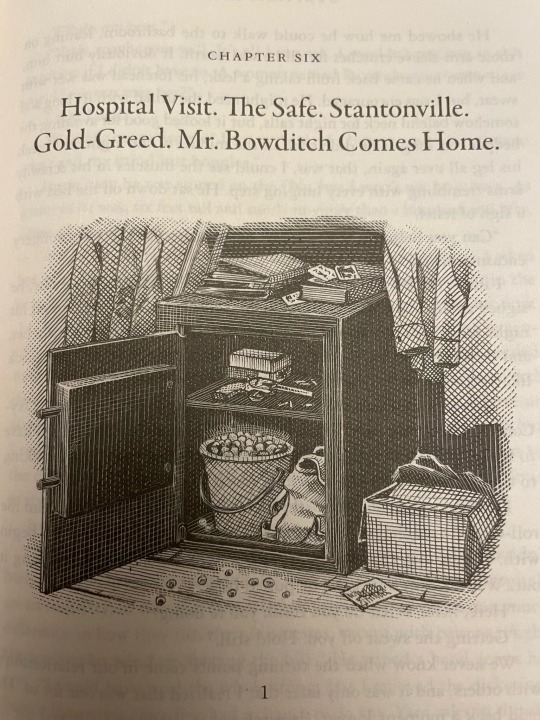
Up to Chapter Six of “Fairy Tale”. Not gonna lie this story moves at a much slower pace than I’m accustomed to. Maybe it’s just me and I’m used to reading more action-packed books where the plot moves at a rapid pace. So this book is something new and hopefully by the end in a good way. As usual Radar and Mr. Bowditch are the best parts of the story. They have the most distinctive personalities and each chapter we always learn something new about them ! With the frequent mentions of Charlie watching YouTube … did YouTube pay Stephen King to write this book 😆? Calling it now, the “BB”s are gonna be gold ✨.
Art by @nicolasdelort
#I took a long hiatus from this book to finish Emily Windsnap so can now return to this#Stephen king#fairy tale#Stephen king fairy tale#book#illustration#illustrations#review#recap#reaction
6 notes
·
View notes
Note
For the ask thing: is there a media (written, film, series...) you're really into right now?
Whelp, I doubt any of my followers managed to avoid noticing the giant Dimension 20-shaped hole I fell into like half a year back, and it's currently airing the third season of the silliest sweetest High School drama and these characters have my entire heart. I've not been that well for a while I think, and watching both people in their thirties just be very close friends and also watching the very thight-knit teenagers they're playing is giving me so much serotonin by proxy. It is addictive and frankly a bit of a problem, but I do really recommend it, everything they do is so fascinating narratively and I think it's taught me a lot about writing.
It's also invigorated a dormant trait of my personality which is that I was apparently abnormally into Grimm's fairy tales even for a German child? This comes up every now and again and then I immediately forget it but I've been really wanting to buy a copy and read some of them again, dark confusing fairy tales are my absolute catnip and maybe I could actually do it on purpose for once.
#the funniest thing where this came up was when we did an excursion to the fairy tale fountain in berlin at uni#and the guide there was all smug going 'oh well you kids these days won't recognise most of these but have a guess it'll be funny!'#cut to me walking around the fountain naming every single fairy tale without hesitation. even the one HE didn't get.#and being genuinely confused at the reaction of all my classmates. I thought we all just did that!! i really did!#i have several posts where i just rant about the frog prince in the tags a propos of nothing buried somewhere on my blog#iron henry lives rent free in my head and has since early childhood#so yeah d20's neverafter while nowhere near my top three really cemented something#if nothing else the fact that i feel SEEN to the point of discomfort by like 4/5 of brian murphy's characters#ask meme responses#spacepandar#thank you dear!#dimension 20#fairy tales#brothers grimm
1 note
·
View note
Text
OUAT Rewatch: Season 1
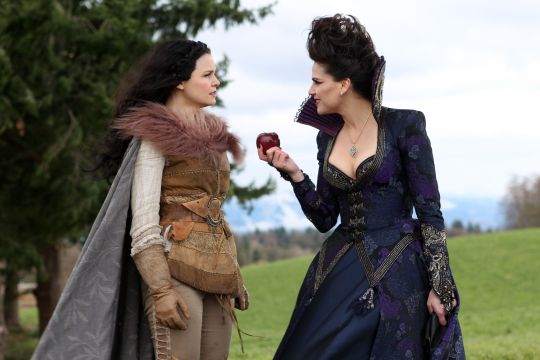
I started writing down my thoughts as I watched each episode, and got kind of carried away with it as I got further in! So here are my thoughts on most of the episodes of Season 1 of Once Upon a Time.
(Spoilers for future seasons are noted in parentheses.)
Episode 2 “The Thing You Love Most”
~ Emma and Regina both have a death/rebirth moment involving fire. The first leads into the second: Emma burns the pages about her birth, and Regina burns her father’s heart.
~ The fact that Regina was willing to sacrifice her father impresses upon the audience the possibility that the young Henry could also become collateral damage in her effort to destroy everyone’s happiness.
Episode 4 “The Price of Gold”
~ I had forgotten about Henry’s Cinderella moment, losing his shoe as he goes up the stairs!
Episode 5 “That Still Small Voice”
~ The fact that Geppetto’s parents turned into puppets raises a lot of questions about both character and worldbuilding. Why did Geppetto decide to make Pinocchio? Why was the Blue Fairy able to bring Pinocchio to life, but not Geppetto’s parents?
Episode 6 “The Shepherd”
~ “Remember what happened to Frederick” sounds like a throwaway line, like an allusion to a tragicomic incident in Midas’ past, but it’s actually setup for a later episode in this season!
~ David is like his namesake in the Bible, as he starts out as a shepherd but then becomes a king.
Episode 7 “The Heart is a Lonely Hunter”
~ What Regina did to the Huntsman—basically making him her sex slave—is really horrendous, and seems to be unknown to everyone else. The series moves along in such a way that it seems the audience is meant to forget about him.
~ (Spoiler:) What happened to the Huntsman when Snow and Charming took back the kingdom from Regina? Did he remain in her thrall to the very end? Could they not have rescued him at some point?
~ Emma makes a good point about how Regina drives away the people she claims to love. She reminds me a little of Orual, the queen and stepsister in Till We Have Faces.
~ Graham’s fate shows that when Regina cannot control something, she will try to destroy it.
Episode 8 “Desperate Souls”
~ Mr. Gold says, “I do hope they won’t break my little bell.” Was this foreshadowing Belle?!
Episode 9 “True North”
~ In Storybrooke, Ava and Nicholas are repeatedly shown eating candy or dessert!
~ I don’t like Emma’s harsh characterization of the foster system, like all foster families are in it only for the money. There are good, decent foster parents out there. Every foster kid’s experience is different, and Emma’s was pretty unusual in that she had no parents but was never permanently adopted.
~ I think this is the first time we see Regina trying to take someone else’s children to keep as her own. It’s interesting in that it shows how long she has wanted a family, and how long she sought it in the wrong ways.
Episode 10 “7:15 A.M.”
~ I love Snow and Grumpy’s relationship! They’re kind of polar opposites, unflagging optimism versus jaded pessimism. But they have some qualities in common, like loyalty and determination.
~ I wish we got to see more of the dwarves’ dynamics. Stealthy deserved better! And he speaks so casually about Doc making knockout gas!
~ It’s kind of beautiful that on the night their brother dies, the dwarves take in Snow, who has pretty much lost everything.
Episode 11 “Fruit of the Poisonous Tree”
~ (Spoiler:) Henry was recording the stories long before he became the Author! Kind of fitting that his scene (not) talking about it is with August, who eventually reveals the role of the Author.
Episode 12 “Skin Deep”
~ Belle’s very first line on the show is an expression of hope in Rumplestiltskin.
~ The princesses/heroines going on a girls’ night is a cool idea!
~ It is rather remarkable that Rumplestiltskin lets Belle leave for that errand. It’s like that saying, “If you love something, set it free, and if it loves you, it will come back.” Either he trusts that she’ll keep her word, or he hopes she cares enough about him to come back. But if she had taken that opportunity to leave, would he have punished her or her town?
~ Rumple’s tantrum is on a level with Kylo Ren, destroying everything in a given room.
~ Rumple is shown smashing most of the tea service, then sparing the chipped cup. But then, the chipped cup and a teapot are shown in Belle’s cell. Did he bring her food, or magically transport it there, before releasing her?
~ The sorcerer’s apprentice’s hat is visible in Rumple’s home!
~ The moment when Rumple puts the cup on a pedestal and cries over it—somehow that, to me, is the most Beauty and the Beast moment. It’s the part of the story expressed in “If I Can’t Love Her Reprise” in the stage show and “Evermore” in the 2017 movie. He believes he has lost her forever, and he is haunted by her memory, which he nevertheless still treasures.
~ It seems that Regina manipulated both Belle in the past and Mo in the present, in order to get Rumple/Gold to turn on them.
Episode 13 “What Happened to Frederick”
~ Granny saying “If you won’t, I will” regarding August reminds me of the grandma in Mulan seeing Shang for the first time.
~ The idea that “something lost will be returned to you” through water sounds like the song “All is Found” from Frozen II.
~ I wondered why the camera paused for so long on that guy Kathryn bumped into at the school; turns out it was Frederick!
~ The red spray paint in Regina’s desk draw suggests she, or someone working for her, was the one who spray-painted “tramp” on Mary Margaret’s car!
Episode 14 “Dreamy”
~ After seeing Snow and Grumpy’s first meeting earlier in the season, it’s great to finally see their Storybrooke counterparts interact! They really are an odd, unlikely pair, but that’s what makes their friendship so endearing.
~ I also love Belle and Grumpy’s friendship, which we see begin in this episode.
~ Interesting that when Belle gets her freedom, she does not return to her village. It must be the first time she is truly free, without any responsibility, so she makes it last a while!
~ Dreamy/Grumpy’s storyline in this episode seems to go against the backstory he shared with Snow. Did he later regret his actions and try to win Nova back?
~ I hated what Granny did and said to Mary Margaret in the previous episode, but I love that they have a nonverbal reconciliation in this one, with Granny lighting her candle.
Episode 15 “Red-Handed”
~ I love the visuals of this episode, with Red’s cloak contrasted against Snow’s white ensemble. The shots of Red and Snow tracking through the snowfall are beautiful—that had to be real snow, right?
~ After meeting and staying with Red, Snow adopts her hairstyle with a ribbon in a braid.
~ David and Red experience the same thing in their respective timelines, having gaps in their memory and wondering if they are the culprit of a crime.
~ It seems a little odd that Red doesn’t suspect Snow, a stranger who showed up the night of the attack, of being the wolf.
~ I think Red should have been the one to have the idea to talk to Peter, rather than Snow suggesting it.
~ So many characters in this season say “I hope you find what you’re looking for.”
Episode 16 “Heart of Darkness”
~ I wish we saw more of Snow White’s time living with the dwarves. Then again, I wish it had been during a happier period of her life, when she was not suffering from a broken heart or memory loss.
~ Henry deals with an emotional blow the same way his mothers and other characters do: getting a drink at Granny’s bar!
~ “Evil doesn’t always look evil. Sometimes it’s staring right at us, and we don’t even realize it.” So true!
~ Snow’s reconciliation with the dwarves is so sweet, and I love seeing them line up to help her!
~ Cutting from Gold telling Emma “You’re more powerful than you know” to Rumple bottling her parents’ hairs to make the magic of love + the high-pitched version of Snow and Charming’s theme = brilliant!
Episode 17 “Hat Trick”
~ This is the episode that feels most contrived in this season. Mary Margaret breaking out right after Emma asked her to have faith in her, and Emma being so kind and trusting toward Jefferson, both seem out of character. A core part of Emma’s personality—one that she works to overcome throughout the series—is that she protects herself and does not trust people easily. She is not the type to go into a strange man’s home and drink something he prepared. The whole detour is even more odd because she’s supposed to be searching for her missing friend.
~ “I’d rather lose my job than my friend.” Yeah Emma! Granted, she hasn’t had many friends in her life, so it makes sense that she would be protective of Mary Margaret, the only friend that hasn’t let her down in some way.
~ Jefferson promising not to miss Grace’s tea party is like Captain America promising Peggy Carter a dance. (It’s hard not to think about the Marvel films Sebastian Stan has been in while watching him in this show.)
~ Jefferson’s hat seems like a cross between a Portkey in the Harry Potter books, and the Wood Between the Worlds in The Magician’s Nephew. I wonder if that room is based on the one Alice comes to after going down the rabbit hole, where she has to open a door. The door to Oz can also be seen there, foreshadowing its introduction to the show!
~ Jefferson mentions Regina’s father even before he is revealed in the episode! Nice, subtle setup.
~ I wonder if the character of Jefferson is modeled after Sweeney Todd. A hatter and a barber both deal with people’s heads, and the way Jefferson sharpens his scissors made me think of Todd’s razors. Both men also have a daughter whom they were unjustly separated from due to a tyrant.
~ Jefferson raises some big philosophical questions about the nature of story and inspiration. Unfortunately this show tends to either leave those questions unanswered, or does a poor job of trying to answer them.
~ All the setup is there foreshadowing that Cora is the Queen of Hearts. But who is the King of Hearts? How did he end up with her, and what was their relationship like?
~ If Jefferson was stuck in Wonderland, how did he end up in Storybrooke? Didn’t the curse only touch the Enchanted Forest?
~ Emma is an amazingly convincing actress and liar. She comes across as so sympathetic, even when terrified, and she might be mixing truths into her acting.
~ Emma actually starts believing at the end! Maybe her belief would have grown if August didn’t make it so personal.
Episode 1x18 “The Stable Boy”
~ (Spoiler:) Cora wears a heart-shaped pendant, even before she became the Queen of Hearts—and ironically, when her own heart was no longer inside her.
~ The scene of Cora and young Snow is hard to watch, knowing what Cora has already done and what Snow will do. And it’s no wonder Snow caved in: she’s never seen duplicity in anyone, especially not a mother.
~ So much foreshadowing when Cora talks about the sacrifices she had to make.
~ Bailee Madison does a fantastic job of imitating Ginnifer Goodwin’s mannerisms. She adds even more childlike innocence and naivete to Snow’s idealism.
~ It’s fitting that Ruby is the one to find Kathryn, after being the one to find the box with the heart; but there could have been another scene, or even just a shot, to show how she’s been doing since then. She was pretty torn up about it, and she must be relieved to be able to set things right.
Episode 1x19 “The Return”
~ I had forgotten that Emma suspects Gold of kidnapping Kathryn. I’m glad this was addressed, because it seems to be forgotten as other storylines push forward.
~ I kind of wish that at some point, they had showed Rumple stopping the battle in the Ogre Wars, rather than the characters just describing it. It must have been an incredible moment for him, as someone who had always been afraid and was too scared to go to battle when he was enlisted.
~ The misdirection in this episode is kind of brilliant. August goes to the Mother Superior to ask for advice about his father, and Rumple thinks it’s Baelfire going to the Blue Fairy as he did in the past, but it’s really Pinocchio going to the Blue Fairy to seek advice about approaching Geppetto/Marco. And then, to top it off, Rumple goes to Jiminy Cricket for advice!
~ What Regina did, causing David to doubt/betray Mary Margaret, and what Mary Margaret describes, poisoning their relationship, is exactly what Satan does.
~ Mary Margaret’s words about the one person you counted on not being there for you is similar to what happens between Rumple and Baelfire in this episode.
~ (Spoiler:) I’m confused about how common magic beans are in the Enchanted Forest. The Blue Fairy says the one she gives Baelfire is the last known to them, and apparently they’re so rare that he needs to construct the Dark Curse to cross worlds. But just a few years later, Hook gets his hands on one; and centuries later, James and Jack talk about them as though they are rare and valuable but not unheard of.
~ For August to deceive Gold by impersonating his long-lost son is pretty cruel.
~ (Spoiler:) August’s actions also don’t quite fit, because it is later revealed that he actually met Neal on at least two separate occasions, one of them while en route to Storybrooke just after Emma arrived.
~ What did Gold hope to get out of August making Emma believe?
~ “He hasn’t been himself for a while.” True in more than one sense for Sidney/Mirror/Genie!
~ Love Emma at the end: she is FIERCELY protective of the people she loves!
Episode 1x20 “The Stranger”
~ Love Henry’s defiant confrontation of Regina!
~ The Blue Fairy says the enchanted tree is the last in the entire realm. I wonder, were there many more, and was that why the land was called the Enchanted Forest?
~ Does the wardrobe just act as a portal? If so, why wasn’t that an option for Rumplestiltskin? Did his magic not mix well with that kind?
~ I don’t understand why Regina tries to seduce David, considering he’s not even on good terms with Mary Margaret at that point. But David handles it like Gawain in “The Green Knight,” chivalrously refusing the temptress’ advances.
~ The shot of Regina downing the rest of her wine, then throwing the glass and breaking the mirror is pretty great!
~ It’s not very surprising that Pinocchio/August strayed from the right path, since Geppetto set an example of dishonesty and selfishness.
~ I forgot what a strong and emotional reaction Emma has to August’s revelation. From the way she talks, it sounds like on some level she does believe, but she doesn’t want to admit it because she’s so afraid of the responsibility it would put on her. I wonder if she also fears what it would mean for her relationships with her friends/family, since she has such mixed feelings about her parents.
~ How did Emma get home, if she left August behind in the woods? Did they both go back on his motorcycle? Or did she hitchhike or something?
~ It looks like Marco owns a sailboat, even after what happened with Monstro!
~ Emma and Geppetto both try to put their children’s wellbeing before that of the community.
~ Looking at Emma’s overall journey, her “refusal of the call” story beat really lasts this entire season!
Episode 1x21 “An Apple Red as Blood”
~ I’m very curious as to when Regina figured out that Emma was the Savior, the daughter of Snow White and Prince Charming. She seemed to have her first inkling in Episode 2, but when did she become certain?
~ (Spoiler:) It’s interesting that killing Emma would break the curse. Was that foreshadowing the Final Battle of Season 6?
~ Henry’s desperate act at the end of the episode makes sense after his final conversation with August, who seems to already be at the “all is lost” beat of the story before the hero decides to keep fighting.
~ “You may have wakened the sleeping dragon.” Was that setup for next episode?
~ Subtle foreshadowing from Archie: it’s true that Regina wouldn’t directly, intentionally hurt Henry, but it’s quite possible for him to get hurt by her efforts to hurt others.
~ “Is this how it’s always gonna be? Us taking turns finding each other?” “We will be together.” Both were right!
~ If Regina didn’t think of getting the apple until Jefferson suggested reaching through with her hand, what was she planning to do or get from the other world? And apparently the hat also enables time travel to a degree?
~ “Haven’t we both suffered enough?” True in more than one way: they both had more suffering in store, thanks to Regina’s vengeance.
~ (Spoiler:) Snow and Charming seem to be “one heart” even before they share a heart, as they sense when the other is hurt.
~ Did Regina not know or care what happened to the rest of the cursed apple after Snow bit it?
~ Interesting to see Emma wearing a skirt and Regina wearing pants when they talk. It’s almost a reversal of their usual attire.
~ There is no way would Emma eat anything Regina made, especially now, knowing that she tried to frame Mary Margaret.
~ I hadn’t realized that Henry falls exactly the same way his grandmother Snow does after eating the apple!
Episode 1x22 “A Land Without Magic”
~ I love that they brought Graham back for the finale, and he’s still protecting Snow! I guess even though Regina his heart, he still has some autonomy.
~ That might be the longest and most ominous title sequence yet!
~ Does picking up the book make Emma actually see, or remember, the flashbacks to her birth? Is it meant to be like Moses in The Prince of Egypt?
~ The look on Emma’s face when Regina reveals Mr. Gold’s real name could be interpreted two ways: A) she is incredulous that they are talking seriously about fairy tale characters; B) she is horrified to learn that Gold is that particular villainous character.
~ Does Regina have the power to just transport anyone anywhere, even remotely? That’s a formidable power from a strategy perspective.
~ Charming is so done with Rumple and all these villains!
~ Did Emma not see Jefferson lurking in the hospital room? Why is Regina comfortable leaving him there with Henry?
~ It’s really telling that Emma goes to see August before going to battle. She is not seeking any material help, just moral support. Then he ends up filling the role of the fallen mentor whose death motivates the hero.
~ It’s pretty symbolic that the town’s library isn’t running! Just like the clock until Emma came.
~ I forgot that Emma sees Snow’s coffin!
~ When you think about it, putting the egg inside Maleficent was really a violation of her person. (Spoiler: Was she carrying it inside her the next few times Snow and Charming saw her, as shown in Season 4?)
~ Mary Margaret probably reads the book to Henry while he’s in the coma because when she did that for David it woke him up.
~ Does Jefferson work for the hospital? That’s the only explanation I can think of for how he obtained a uniform, knew the passcode, could give the desk nurse a drink without being questioned, and knew that Belle was there.
~ How did Jefferson know about Belle’s connection to Mr. Gold?
~ Emma’s fight with the dragon might be symbolic of her own internal battle.
~ When she destroys the dragon, she looks like she’s exhausted and can’t believe she just did that.
~ I’m confused about the timeline in the present day. It looked like Emma went down the elevator shortly before midnight, but when David gets in his car it’s 7:00 a.m.
~ The Mother Superior must be a hospital chaplain. I wonder who called her to Henry’s room—somehow I doubt Regina would ask for a religious person to come if anything happened to her son.
~ Ironic that Regina is the one to say “You did it” when Emma breaks the curse(s)!
~ Henry looks at Emma with so much pride!
~ Such a good finale!
3 notes
·
View notes
Text
my dogs name is saturnine (after a song my family likes) and this lady misheard it and kept calling her “sevens and nines” and i think thats kinda badass i kinda wanna take it
#the reaction to her name is either not knowing that saturnine is an actual word#or being like. why the fuck would u name ur dog that#techincally its an adjective that means gloomy. but like the song is rlly good i promise#but my pets have never fit naming conventions. there were the actual names ones (annie#and tommy and ophelia and norma) then there were the collection of whatever felt right#bruce wayne. obviously.#then rinkrank. named after an obscure old fairy tale.#then sweetpants. which i totally made up her name at 2 yrs old#then. wool. bc he was soft#then of course. Brzeska. who was named not after the artist. but his wife#and was pronounced as ‘br-esh-ka’ bc thats how my dad felt it should be pronounced even tho thats not right..#there was also silla. tho idk how she was named. and fluffy who had his name before he lived with us..#and finally theres my brothers cat. aster which i think is a boring name but whatev
5 notes
·
View notes